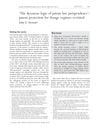 27 citations,
May 2015 in “Neuropharmacology”
27 citations,
May 2015 in “Neuropharmacology” Dutasteride protects dopamine neurons in Parkinson's mice, but Finasteride doesn't.
 23 citations,
January 2021 in “Biomedicine & Pharmacotherapy”
23 citations,
January 2021 in “Biomedicine & Pharmacotherapy” DHT stops hair regrowth in mice, similar to human hair loss.
[object Object]  23 citations,
July 2007 in “The journal of investigative dermatology/Journal of investigative dermatology”
23 citations,
July 2007 in “The journal of investigative dermatology/Journal of investigative dermatology” Hair follicle bulge cells don't help skin regrow after glucocorticoid damage; interfollicular epidermis cells do.
 22 citations,
November 2011 in “Journal of Analytical Toxicology”
22 citations,
November 2011 in “Journal of Analytical Toxicology” Scientists have developed a new method to detect steroid abuse in athletes using cell-based tests, which could be the future of anti-doping methods.
 21 citations,
March 2018 in “Experimental Dermatology”
21 citations,
March 2018 in “Experimental Dermatology” The guide explains how to study human skin fat cells and their tissue, aiming to improve research and medical treatments.
 18 citations,
January 2013 in “Postepy Dermatologii I Alergologii”
18 citations,
January 2013 in “Postepy Dermatologii I Alergologii” Puberty often causes skin issues like acne and excessive sweating, and treatments require patience as results may vary.
 15 citations,
May 2004 in “Facial Plastic Surgery Clinics of North America”
15 citations,
May 2004 in “Facial Plastic Surgery Clinics of North America” Treat pattern hair loss with finasteride and topical minoxidil.
 14 citations,
March 2010 in “Gynecological endocrinology”
14 citations,
March 2010 in “Gynecological endocrinology” New treatments for excessive hair growth in women include insulin modulators and enzyme inhibitors.
 13 citations,
January 2014 in “Aesthetic Surgery Journal”
13 citations,
January 2014 in “Aesthetic Surgery Journal” Cyperus rotundus oil effectively reduces unwanted hair without side effects.
 13 citations,
July 1996 in “Annals of Internal Medicine”
13 citations,
July 1996 in “Annals of Internal Medicine” International medical graduates outperformed U.S. graduates on an internal medicine exam.
 13 citations,
July 1996 in “Annals of Internal Medicine”
13 citations,
July 1996 in “Annals of Internal Medicine” International medical graduates outperformed U.S. graduates on an internal medicine exam.
 12 citations,
September 2011 in “Archives of Dermatological Research”
12 citations,
September 2011 in “Archives of Dermatological Research” Policemen have more hair loss due to obesity, sunlight exposure, and stress.
 12 citations,
January 2010 in “European Journal of Dermatology”
12 citations,
January 2010 in “European Journal of Dermatology” Norgalanthamine from Crinum asiaticum may help hair grow.
 11 citations,
June 2011 in “Expert Review of Dermatology”
11 citations,
June 2011 in “Expert Review of Dermatology” Skin reactions to drugs are common and can be deadly, usually requiring stopping the drug and may be better prevented with genetic testing in the future.
 9 citations,
January 2016 in “Skin Pharmacology and Physiology”
9 citations,
January 2016 in “Skin Pharmacology and Physiology” The study concluded that both estrogen and androgen receptors, which decrease with age, are linked to skin aging and may be hormonally regulated.
 9 citations,
July 2002 in “Journal of the European Academy of Dermatology and Venereology”
9 citations,
July 2002 in “Journal of the European Academy of Dermatology and Venereology” The document concludes that fexofenadine reduces inflammation in chronic hives, cholestyramine helps half of pregnant women with itchy rashes, and relaxing incisions are a good alternative in facial surgery for the elderly.
 8 citations,
November 2019 in “Dermatologic Clinics”
8 citations,
November 2019 in “Dermatologic Clinics” AGA treatments like minoxidil and LLLLT are safe and effective for gender minority patients.
 8 citations,
January 1996 in “Springer eBooks”
8 citations,
January 1996 in “Springer eBooks” Male pattern baldness may be caused by factors like poor blood circulation, scalp tension, stress, and hormonal imbalances, but the exact causes are still unclear.
 7 citations,
June 2021 in “Trends in Food Science and Technology”
7 citations,
June 2021 in “Trends in Food Science and Technology” Western diet may cause male pattern baldness; low glycemic diet with magnesium could help.
 7 citations,
March 2017 in “Medical Hypotheses”
7 citations,
March 2017 in “Medical Hypotheses” Aquaporins could be new drug targets for treating polycystic ovary syndrome.
 7 citations,
January 2016 in “Laboratory Investigation”
7 citations,
January 2016 in “Laboratory Investigation” TR3 is mainly found in hair follicle stem cells and may be involved in hair loss.
 6 citations,
May 1997 in “Journal of Dermatological Science”
6 citations,
May 1997 in “Journal of Dermatological Science” Researchers found a gene in hamsters that responds to male hormones and may be indirectly controlled by them.
 4 citations,
May 2020 in “Dermatologic Therapy”
4 citations,
May 2020 in “Dermatologic Therapy” Redenyl lotion effectively promotes hair growth and improves quality of life for androgenetic alopecia patients.
 4 citations,
October 2007 in “Dermatologic Clinics”
4 citations,
October 2007 in “Dermatologic Clinics” Glucocorticoids and sex hormones affect skin health, with potential for targeted treatments to minimize side effects and treat skin conditions.
[object Object]  4 citations,
July 1996 in “Annals of Internal Medicine”
4 citations,
July 1996 in “Annals of Internal Medicine” High doses of fluconazole can cause reversible hair loss.
 3 citations,
January 2010 in “Elsevier eBooks”
3 citations,
January 2010 in “Elsevier eBooks” The document describes various skin conditions, their features, and treatments but lacks detailed study size information.
 2 citations,
May 2023 in “bioRxiv (Cold Spring Harbor Laboratory)”
2 citations,
May 2023 in “bioRxiv (Cold Spring Harbor Laboratory)” Sebaceous glands can heal and regenerate after injury using their own stem cells and help from hair follicle cells.
 2 citations,
October 2020 in “Dermatologic Therapy”
2 citations,
October 2020 in “Dermatologic Therapy” Herbal solution improves hair diameter and density more than 5% minoxidil for androgenetic alopecia.
 1 citations,
December 2011
1 citations,
December 2011 Marine-derived ingredients show potential for hair health but need more human trials to confirm effectiveness.
 1 citations,
April 2009 in “Journal of Intellectual Property Law & Practice”
1 citations,
April 2009 in “Journal of Intellectual Property Law & Practice” UK courts and the European Patent Office are now more open to granting patents for new dosage regimes.






























